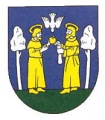Category:Saints Cyril and Methodius: Difference between revisions
Knorrepoes (talk | contribs) (Created page with '{|width="100%" style="color:black; background-color:#ffffcc;" |width="15%"|left |width="70%" align="center" |<font size=x-large>'''Heraldry of the World<br/>[[…') |
Knorrepoes (talk | contribs) m (Text replacement - "{{themes1}}" to "{{themes}}") |
||
| (18 intermediate revisions by the same user not shown) | |||
| Line 1: | Line 1: | ||
Coats of arms showing the Saints Cyril and Methodius. | Coats of arms showing the Saints Cyril and Methodius. | ||
Saints Cyril and Methodius (Greek: Κύριλλος καὶ Μεθόδιος, Old Church Slavonic: Кѷриллъ и Меѳодїи[more]) were Byzantine Greek brothers born in Thessaloniki in the 9th century. They were Christian missionaries among the Slavic peoples of the First Bulgarian Empire, Great Moravia, and Pannonia. Through their work they influenced the cultural development of all Slavs, for which they received the title "Apostles to the Slavs". After their deaths, their pupils continued their missionary work among other Slavs. Both brothers are venerated in the Orthodox Church as saints with the title of "equal-to-apostles". In 1880, Pope Leo XIII introduced their feast into the calendar of the Roman Catholic Church. In 1980, Pope John Paul II declared them co-patron saints of Europe, together with Benedict of Nursia. | Saints Cyril and Methodius (Greek: Κύριλλος καὶ Μεθόδιος, Old Church Slavonic: Кѷриллъ и Меѳодїи[more]) were Byzantine Greek brothers born in Thessaloniki in the 9th century. They were Christian missionaries among the Slavic peoples of the First Bulgarian Empire, Great Moravia, and Pannonia. Through their work they influenced the cultural development of all Slavs, for which they received the title "Apostles to the Slavs". After their deaths, their pupils continued their missionary work among other Slavs. Both brothers are venerated in the Orthodox Church as saints with the title of "equal-to-apostles". In 1880, Pope Leo XIII introduced their feast into the calendar of the Roman Catholic Church. In 1980, Pope John Paul II declared them co-patron saints of Europe, together with Benedict of Nursia. | ||
By clicking on the image, it will be enlarged. To go to the page(s) where the image is being used, follow the links under the heading '''File usage''' at the bottom of the image page. | |||
{{themes}} | |||
Latest revision as of 05:17, 19 September 2023
Coats of arms showing the Saints Cyril and Methodius.
Saints Cyril and Methodius (Greek: Κύριλλος καὶ Μεθόδιος, Old Church Slavonic: Кѷриллъ и Меѳодїи[more]) were Byzantine Greek brothers born in Thessaloniki in the 9th century. They were Christian missionaries among the Slavic peoples of the First Bulgarian Empire, Great Moravia, and Pannonia. Through their work they influenced the cultural development of all Slavs, for which they received the title "Apostles to the Slavs". After their deaths, their pupils continued their missionary work among other Slavs. Both brothers are venerated in the Orthodox Church as saints with the title of "equal-to-apostles". In 1880, Pope Leo XIII introduced their feast into the calendar of the Roman Catholic Church. In 1980, Pope John Paul II declared them co-patron saints of Europe, together with Benedict of Nursia.
By clicking on the image, it will be enlarged. To go to the page(s) where the image is being used, follow the links under the heading File usage at the bottom of the image page.
| Heraldry of the World | Overview of images by theme (shield division, charges, images) |
|
Top 10 topics:
|
Charges (items): |
Media in category "Saints Cyril and Methodius"
This category contains only the following file.
- Brodske.jpg 174 × 199; 11 KB

